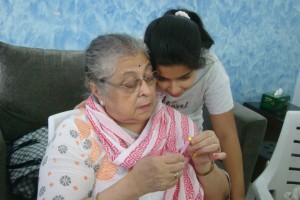Contact Us




Illness of any kind always has an impact on family members. This specially holds true for dementia. The effects it has on the children and spouse of the person affected is often discussed and researched about. However, there’s always a ripple effect that is not limited to the immediate family members. It also passes on to the tiny tots of the family: the grandchildren.
Grandparents and grandchildren share a very special equation. No one quite spoils a grandkid like a grandparent. For them they are angels of god. They look forward to enjoying and revisiting their childhood with them.
The dynamics of this bond however change when the grandparent under goes life altering condition like dementia. As we all know, there will be a range of behaviors demonstrated by our loved ones with dementia: wandering, agitation, repetition and verbal/physical aggression. Seeing beloved grandparents in such a state can be very difficult experience for children of any age: specially from 6 to 16. While, as adults we may reason and understand the difficulties stemming from the condition, it can be viewed very differently by children. Without any proper understanding or clarification about the condition, along with seeing the parents stressed tending to care giving, children may come up with their own conclusions and respond accordingly. Some of the most common responses include:
As Care Specialists, we understand that each person with dementia is different and unique. Similarly, the families that they belong to are all different from one another and have varied dynamics. I would here like to share some of the instances that I have seen happening:
Being exposed to such changes in the family at an early phase of life may hold strong consequences like: shaping the way they see the world and their coping mechanisms. However, keeping certain tips in mind may help us to reach out to the younger ones in a better way.
Important tips:
We at Samvedna Care aim to help seniors live happy, active and independent lives, in the comfort of their home and community through interactive caregiving.
Samvedna Care was established in October 2013 with two complementary goals – firstly to provide quality home care services to seniors with limited mobility or dementia and hence social interaction, and secondly to facilitate stimulating community interaction and participation.
Cognitive Wellness Programme, Sector 57 Gurgaon –
Samvedna’s Cognitive Wellness Programme is designed for seniors with mild cognitive impairment, early dementia or Parkinson’s, and elderly lacking in enthusiasm and motivation. The aim is to stimulate the mind of the elderly to slow the progression of the disease or impairment. The sessions are 3 days a week, 11AM-1PM.
More – http://www.samvednacare.org/our-work/cognitive-wellness-programme
Our Dementia Care services are –
At-home services –
Dementia intervention activities by trained Care Specialists (already mentioned above). These services are available in Delhi NCR and Guwahati
More – https://www.samvednacare.com/service/dementia-care
Please call us for more info – Delhi NCR – 98184 21446, 124 4229659 | Guwahati – 9864015872
Dementia Support Group –
Our Dementia Support group in Delhi NCR and Guwahati is a platform for caregivers to share feelings and support each other.
More – https://www.samvednacare.com/dementia-support-group
Please call us for more info – Delhi NCR – 98184 21446, 124 4229659 | Guwahati – 9864015872